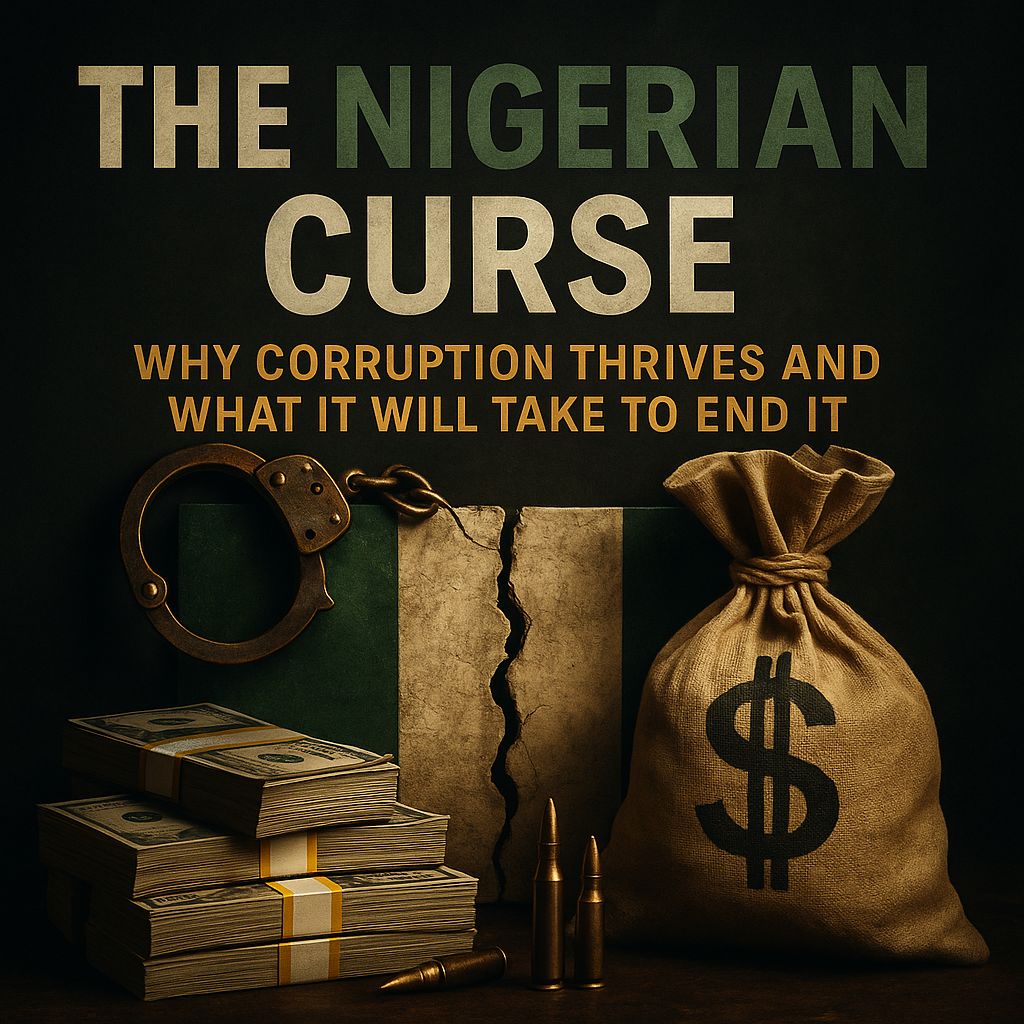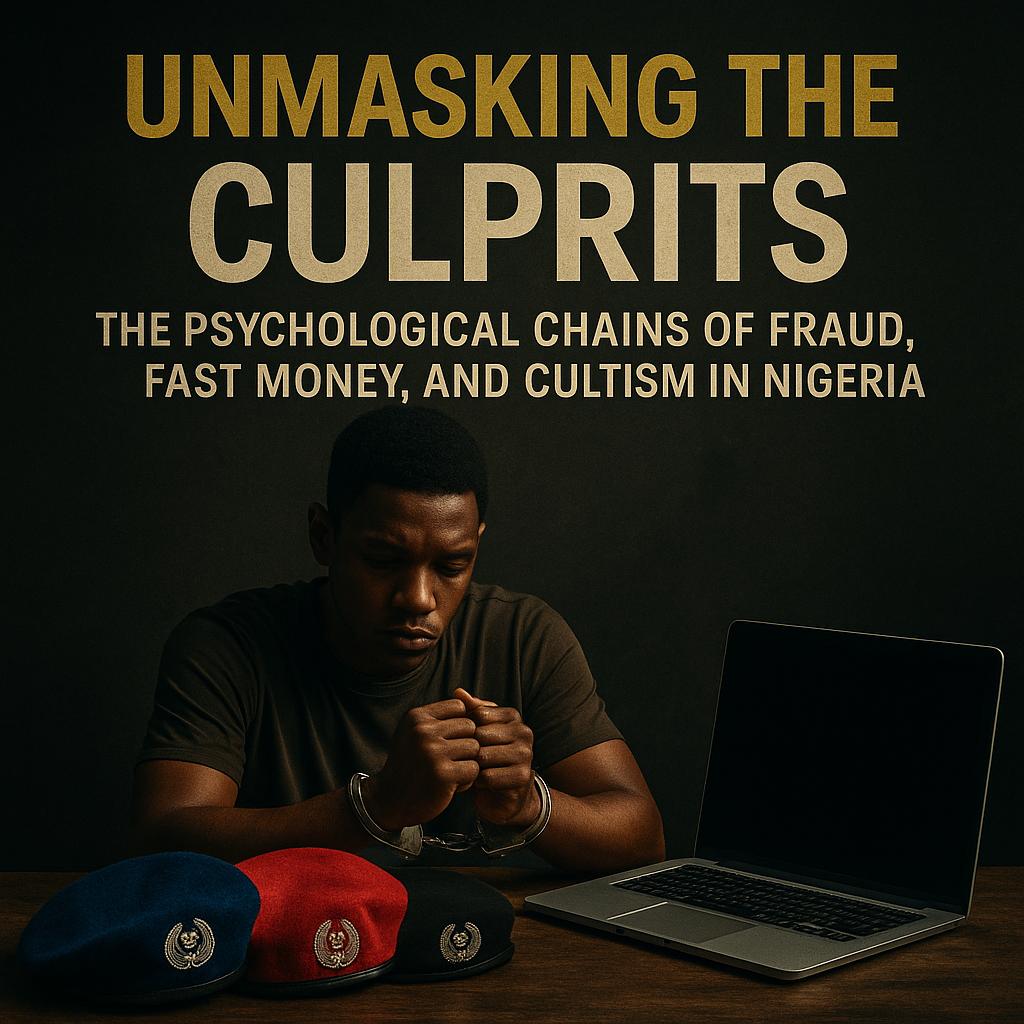The Nigerian Curse: Why Corruption Thrives and What It Will Take to End It
Introduction: The Slow Poison
Corruption in Nigeria is not a disruption of the system. It is the system. It operates like a slow, deliberate poison that has weakened every organ of the state and reshaped the social contract between the Nigerian people and their leaders. It no longer shocks, because it is no longer hidden. It thrives openly, shamelessly, and destructively.
For the Patriots of Nigeria, corruption is the ultimate enemy of the Nigerian state. It is not a flaw to be managed but a monster to be slain. Until we cut off the head of this snake, no reform, policy, or progress will stand the test of time.
Anatomy of Corruption in Nigeria
In Nigeria, corruption wears many faces. And none of them are foreign. It greets citizens at police checkpoints with a demand for “something for the boys.” It hides in inflated government contracts padded with billions in ghost line items. It quietly kills dreams when job slots in public agencies are auctioned to the highest bidder. It lurks in civil service payrolls loaded with ghost workers.
This rot cuts through every level. Federal, state, and local. It does not discriminate between public and private sectors. In religious institutions, leaders preach morality while embezzling church funds. In schools, lecturers exchange grades for sex or cash. In hospitals, procurement scams and fake drugs send thousands to early graves.
Tentacles of the Monster: Key Areas Impacted
- Politics: Elections are no longer contests of ideas but auctions. Votes are bought openly. Political office is monetized, and budgets are looted for campaign funds. Governance is state capture by elite cabals.
- Law Enforcement: Police checkpoints are toll gates for extortion. Investigations collapse when suspects are connected. Justice is reserved for the poor.
- Judiciary: Cases disappear. Judges are bribed. Delayed justice becomes denied justice. Rule of law is a commodity.
- Education: Admission slots are sold. Degrees are earned through payment or sexual exploitation. Institutions crumble from chronic underfunding.
- Healthcare: Budgeted funds disappear. Hospitals lack equipment. Fake drugs circulate freely. The poor die from treatable illnesses.
Cultural Acceptance of Corruption
A dangerous culture has emerged. One where corruption is not just tolerated but expected. “Nothing moves without settlement,” people say. “Shine your eye,” they warn, advising others to cut corners or be left behind. “Man must survive” has replaced collective ethics.
In a broken system, people no longer dream of change. They adapt. Corruption has become the price of access to opportunity, and survival often means playing along.
The Role of the Political Class and Elites
The greatest tragedy is that corruption in Nigeria is not driven by scarcity. It is driven by greed. Nigeria is not a poor nation. It is a looted nation.
The political elite recycle themselves through rigged processes, hiding behind immunity clauses and fake anti-corruption posturing. Investigations are weaponized against opponents and shelved when allies are involved. The foxes are guarding the henhouse.
Sleeping Watchdogs: Press, Police, and Probes
The institutions meant to check corruption are often part of the rot. Investigative journalism in Nigeria has gone quiet. Strangled by poor pay, ownership capture, and fear. Media houses water down explosive stories for envelopes or political favours.
Anti-corruption agencies like the EFCC and ICPC underperform or turn partisan. The police, tasked with enforcement, are themselves mired in bribery.
We at the Patriots of Nigeria believe that this is where the revolution begins. We need investigative frameworks powered not by fear or patronage but by patriotic duty. The Nigerian press must wake up. Follow up journalism must become the norm, not the exception. The media must become the sword and shield of the people once again.
Case Studies: Countries That Fought Back
- Rwanda: After genocide, Rwanda rose from ashes by implementing zero tolerance for corruption. Under Kagame, officials were jailed regardless of status. Institutions were rebuilt on merit and accountability.
- Georgia: Post Rose Revolution, Georgia cleaned up its notoriously corrupt police and built systems of transparency that rebuilt public trust.
- Singapore: Once as poor and corrupt as any, Singapore became a first world nation by establishing ironclad anti-corruption laws and empowering agencies with full independence.
- Botswana: Quietly but consistently, Botswana remains one of Africa’s least corrupt countries, thanks to strong institutions, judicial independence, and political will.
These countries prove that transformation is possible when the political will exists, and corruption is treated as treason, not tradition.
The Way Forward: Cut Off the Head of the Snake
- Mindset Shift: Nigerians must be re-educated to see corruption as betrayal, not hustle. Patriotism must be taught, lived, and rewarded.
- Legislative Reform: Whistleblower protection laws, asset declaration enforcement, and public expenditure transparency must be made non-negotiable.
- Empowered Journalism: The press must rise from its slumber. Citizen powered journalism, fact checking platforms, and independent watchdog groups must be nurtured.
- Civic Networks: Groups like The Patriots of Nigeria must collaborate, document, and expose systemic rot. Change begins with organized truth.
Conclusion: Nigeria Must Break the Curse
The future of Nigeria hinges on one battle. The battle against corruption. It is not just about recovering stolen funds. It is about recovering a stolen future.
We must stop managing corruption and start killing it. Until then, no policy will work, no reform will last, and no dream will thrive.
At the Patriots of Nigeria, we declare: If we do not kill corruption, corruption will kill Nigeria. But there is hope. And that hope is us.




